There is something mesmerising about the tensions in South Africa that writers like Coetzee and Galgut are able to capture with ease. This early book from Galgut was a 6 buck special I found recently, and like The Good Doctor, it was a tightly wound, often chilling read, with violent events exploding out of nowhere. Post-apartheid crime and village life stand bleakly exposed, and overwhelm the senses as a killer posing as a priest is asked to bury his victim amid much suspicion. Not as good as his other one, but once again really impressive writing. 4 stars. 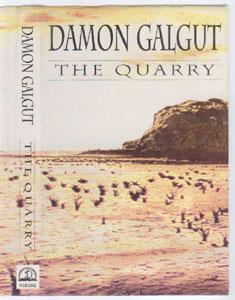
Category: Books
What was his consolation?
In the past four days I’ve roared through a thickish book that I found voyeuristically enthralling, helped by modern day doublespaced, large fonted text found in softbacks. I imagine this is to bump up the sale price, or appeal to older readers with poor eyesight. Probably the former.
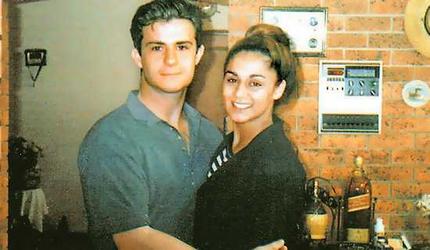
Joe and Anu Singh, his murderer. Joe Cinque’s Consolation is the true story of the murder by deliberate overdose of a 27 year man from Newcastle by his girlfriend in 1997. It follows the court cases of her and several parties who knew or collaborated, and in particular it talks about what justice is for all parties. Helen Garner is a favourite of mine, and whilst famous for not taking the obvious easy feminist line in the controversial “The First Stone”, I sense she wanted less heat from this account and probably had a lot less to say. Often I find myself cringing at emotion-driven writing by women, but somehow hers rings more true to me. She is perceptive and not afraid to reveal the flaws in her decision making. Like a terrier, she tackles topics like the difference between “due care” and a “care of duty” or where the law stops and morality begins, and it never seems boring. It sounds like she really made some lasting friends of the parents of the dead Joe, and her admiration for their continued anger about the leniency of the sentence, and their grace and dignity shines through. She describes her own outrage that a lawyer can so clinically disect an honest witness and remove all traces of humanity from a scenario, so we begin to see them as pathetic and not worthy of consideration. I really liked this book, but towards the end Garner had to lean too heavily on too few people to keep momentum going, and I never did see what the consolation was. His parents were still as troubled and angry about it 5 years later. 4 stars. EDIT: I never read reviews before writing about books, so I just found the consolation. The book itself is Joe’s parent’s consolation. I never thought to take the title so literally. Ninny!
Gulliver’s Travels
This is the sort of book I consider a guilty-pleasure. Four simple Boys Own-style tales of adventure on the high seas. There’s a good chance it inspired TV shows like Land of the Giants, H.R Puff and Stuff, and a whole host of Sci-Fi literature, including Kurt Vonnegut. Although considered a landmark classic for it’s time (1745), I was half way through the stories and beginning to become bored with the “man-gets-shipwrecked-man-staggers-onto-beach-man-discovers-unique-race-of-creatures-man-makes-friends-man-leaves” plot, when it suddenly started to get more weird and interesting.
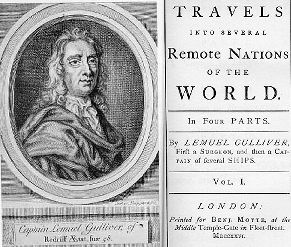
Although the first two tales are almost children’s bed-time stories, (Gulliver gets captured by little folks, and then captured by giants) the writing in the third becomes more satirical and political, where society is governed by impractical musical and mathematician-orientated rulers who use a machine to determine decisions affecting their lives. The fourth story (which after reading the introduction, I had some trepidation about) was a vision of a utopian society run by horses, who kept debauched humanoid figures as their pets and seems to mirror Swift’s increasingly misanthropic attitude in later life. The editor makes much mention of the undeserved avalanche of criticism thrown at Swift for these works at the time, as prude scholars railed to list his various depravities including coprophilia (which I had to look up – getting sexual pleasure from faeces) and his mental health issues. Perhaps these themes came through more strongly in other works because they were minor novelties in this entertaining series of stories. I found the introduction almost more interesting than the book itself, discovering that Swift composed his own Epitath “He has gone where fierce indignation can lacerate his heart no more”, which Yeats referred to as “the greatest epitath in history”. 3.5 stars and an easy, fun read.
Austerlitz
Ask Kim, ask anyone. I give more attention to what a reviewer says about a book or movie than I probably should. Kim used to joke about how part-time teenagers working in video libraries would randomly slap “Highly Recommended” stickers on covers of rental tapes, and fools like me would take them very seriously. My argument was that I was rarely disappointed, so it worked for me. Well, I still do it, and was suckered into reading Austerlitz by W.G.Sebald this month after a flurry of gushing reviews on the cover and inside from the New York Times, The Times from London and others. It was a little different from my usual fare, but words like “mesmeric” and “haunting” floated by, and then the clincher “anyone with a serious interest in fiction should read Sebald” by writer John Lanchester.
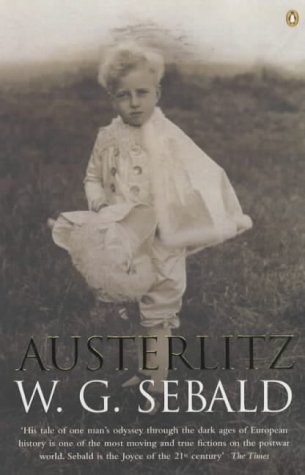
So, what was it like, you ask. Well, it was a funny old rambling piece, with no chapters and as seems to be the trend now, a bunch of small images or photos along the way for those unable to visualise very well. Curiously, written in the first person, but mostly recounted by Austerlitz’s German muse, it dreamily details a Czech’s orphan’s exile (due to WW2) in the U.K and his later attempts in middle age to learn about his past by visiting wartime buildings to re-live his parents tragic ends at the hands of the Nazi’s. Throw in hefty doses of architectural critique and little known (to me) historical info about the fall of Prague, and it’s quite an interesting topic. But I felt the writing let it down. A bit dull, a bit safe and dreamily recalled as a memory that made it feel like a slice of life that no longer matters. Being hot on the heels of the Safran-Foer book from last month, it felt….dullish? So, it gets 3 stars, despite making me want to revisit Europe and learn cultural stuff again. Nice try W.G.
Everything is illuminated
I’m always intrigued by books that I struggle to grasp on first reading, and probably rate them higher than I should for mystery-value. But I never seem to read them again to obtain that perfect understanding. I think it’s because I’m afraid I’ll go over it again and still not get it.

This book was like that. It is so incredibly different to what I expected that I seriously struggled to get my teeth stuck into it at first. Bizarre Jewish shtetl life in 1790’s Russia; first class butchery of the english language by a plucky Ukrainian modern-day translator and tour-guide; awful German atrocities of WW2. This multi-story playful pastiche is a brilliant contrast of tales, all leading to their own tragedies. By page 50, I was back onboard and finally starting to put the pieces together. By 135, I was fascinated by the relationship of Brod and the Kolker. By 185, the creepy tale of Augustine and the lost Trachimbrod village was emerging. It was full scale horror-fest by 225. I’ll say no more, but it was a sad, sad, book, which I hear has been recently made into a movie. 4 stars!
Another book – sorry to disappoint
Emerald Blue was the only remaining book of Gerald Murnane’s that I hadn’t gobbled up until very recently, when it arrived in the mail with his signature and a Post-It note referring to his full head of dark hair and his genetic luck in that regard. I think I’d made a comment that he looked the same today as he did in a documentary 15 years ago.
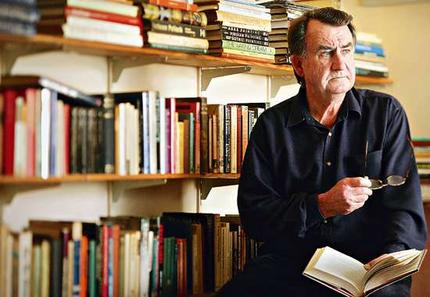
Despite being a huge fan in general of his obsessive, autobiographical style and continual references to Victorian places and topography, a couple of these stories were overly layered, and even nonsensical to me in parts. And occasionally annoying. Whilst other writers would quickly assume the role of narrator and define a subject in a short story (and get on with telling it), Murnane continually redefines and repeats roles and statements to the point of ludicrous stylisation. He refers many times to the main character as (and it’s not a real quote) “the person referred to in the previous paragraph as having an interest in the persons mentioned in the second paragraph in this story”, so it all gets a bit silly after awhile. But I still loved it.
For me, his writing is like junk food because I grab all the tasty factoids about his teenage dating efforts and frugal living habits and just eat it all up. I know I’m missing out on some of more subtle landscape references and wish I too could believe that there is no unconscious thought, just forgotten thoughts. But he’s a unique man, and they broke the mould after crafting Gerald. It takes astonishing honesty as a 55 year old in 1995 to write about falling in love with a 20 year old bank teller. I think he’s a National treasure! 4 stars.
The Complete Polysyllabic Spree
In the past five years or so I’d come to realise that I had more in common with my mother-in-law’s reading tastes than those of my wife. She tends to the more historic/biographic and I toward small-town life/whimsy and so we cross paths around the Peter Carey and Ian McEwan mark. I thought I’d broken the link recently after a slightly desperate suggestion of David Mitchell, who is fairly experimental but rewarding – she gave up very early on. Hmmm.
So, when I received Nick Hornby’s Polysyllabic Spree from her for Christmas, I decided I would give it a fair go, and I only just finished it this morning on the 112 tram, somewhere around the Scotchmer Street mark, after which I was forced to resort to some cruddy crossword-free magazines still in my bag, to avoid having to stare at an annoying but attractive lady sitting opposite me. She was a nightmare, talking about her inadequate boyfriend at full voice on a mobile phone to a girlfriend at 8am who probably didn’t care. But I digress.
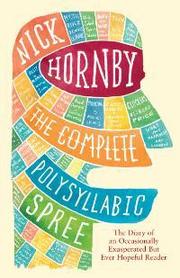
The book is a series of extracts from his monthly column in the U.K where he outlines which books he bought this month, and which he read (usually completely different) and what his thoughts were about all and sundry. Browsing through the lists at the top of each chapter, it was nice to see I knew something about many of them. So, I pretty much read a few chapters at a time and put it down again. For months. Perfect. Little self contained passages. No pressure. Start again each time.
He’s a funny writer and I really enjoyed his book, set over a 3 year period, though his tastes seem too willfully divergent to be natural. He admitted that he wasn’t able to seriously trash anything (darn it – I was waiting for a demolition of The Da Vinci Code) and those he hated were mostly listed as “Anonymous Novel – abandoned”. By far the most annoying part of the book is where he inserts 4-5 pages from his favourite books, which are usually less interesting than his own work. Mostly he loves Dickens, a surprising amount of modern popular stuff (Anne Tyler etc..good on him!) and some scholarly biographic books of letters which are partly there to give him credibility. He even reads an atrocious biography from Motley Crue’s drummer, from which he prints a horrific line at a font size of 1, so you need a magnifying glass to read it. For those who wish to know (I have great eyes), it involves said individual immersing his genitals in a hot piece of take away food (American Pie style) to remove other telltale groupie scents prior to reuniting with wife. And on that stunning note I finish. 4 out of 5 stars.
Affluenza
I don’t have the book on me, but seeing as I haven’t got much to show in the book progress stakes lately, I thought I’d throw a few quick words in about it.
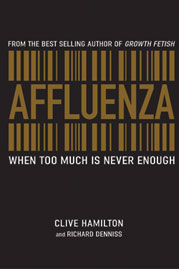
I think Kim read it a couple of years ago, and I’m not sure how it influenced her/our behaviour, but it was certainly worth me reading also. Although a bit repetitive by the end, there are very readable and non-hysterical sections about overconsumption, (lack of) happiness and the myth that (most) Austalians are “doing it tough”. Whilst it laid the blame for many western modern-day ailments on advertising and the market’s need for continual increased profit, I was left wondering whether perhaps human nature itself would have brought us to this point perhaps at a less accelerated rate.
Towards the end of the book (which has many thought provoking statements and is definitely worth a look) the authors become more positive about what can be done to combat many families suffering dissatisfaction, stress and huge debt. Whilst the concept seems dated and not so revolutionary now, downshifting to lower paid or less demanding but more satisfying jobs is floated as a solution. I whizzed through this book in a few days and enjoyed it, but Naomi Klein’s “No Logo”, despite being on a slightly different topic, is better researched and more convincing, and is the one to read in this field. 3.5 stars.
Youth
Before proclaiming J.M.Coetzee a genius, I need to read more of his books, but on the strength of Disgrace and now, Youth, he’s up there in my top 10 writers. And he lives in Adelaide. I cranked through Youth in a few days after weeks of getting to bed too late and playing World of Warcraft. Because I’m riding a lot also, this year is shaping up as one of my least read since I started recording these things in the early 90’s.  What is it about books in the third person present with almost no dialogue that attract me? This one details what must surely be an autobiographical account of his early twenties in London in the early 60’s. A lonely, serious young man seeks culture and an intellectual life – and seems to bed a swag of women in the process and finds all of them unloveable. Defiantly warding off all correspondence with family at home in South Africa, he finds works in a computer department for IBM, and tries to write poetry, and finally in desperation, fiction at night. In nearly everything he finds himself to be a failure. Whilst some would find this depressing, I found some parallel’s with my own aspirations and could immediately relate to it. Kim says she read he’s a grumpy, cantakerous old bastard nowdays and reading about this early life angst, I don’t doubt it. 4.5 stars.
What is it about books in the third person present with almost no dialogue that attract me? This one details what must surely be an autobiographical account of his early twenties in London in the early 60’s. A lonely, serious young man seeks culture and an intellectual life – and seems to bed a swag of women in the process and finds all of them unloveable. Defiantly warding off all correspondence with family at home in South Africa, he finds works in a computer department for IBM, and tries to write poetry, and finally in desperation, fiction at night. In nearly everything he finds himself to be a failure. Whilst some would find this depressing, I found some parallel’s with my own aspirations and could immediately relate to it. Kim says she read he’s a grumpy, cantakerous old bastard nowdays and reading about this early life angst, I don’t doubt it. 4.5 stars.
Adrift in the Oceans of Mercy
It sounds like a really profound read, but (now deceased) Martin Booth’s story of a Russian Cosmonaut abandoned in the MIR spacestation is really quite straightforward. Captivating for it’s description of the minutiae of day-to-day spacecraft life contrasted against coarse outdoors and hunting stories from his rustic past and early military training, a Cosmonaut contemplates his fate. 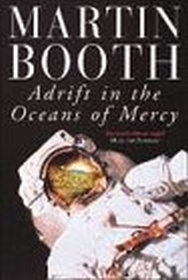 The purity of space is set against mankind’s fouling of the atmosphere. The irony of this is not lost on our space traveller when the vessel’s equipment starts to falter courtesy of some U.S space-junk and malfunctioning human waste filters. It was a very pleasant and refreshing read; the sort of thing you could pick up and read a chapter or two and the then drop it for days (like I did). The writing was crisp and precise, much like the disciplined life aboard the craft. I give it 4 stars.
The purity of space is set against mankind’s fouling of the atmosphere. The irony of this is not lost on our space traveller when the vessel’s equipment starts to falter courtesy of some U.S space-junk and malfunctioning human waste filters. It was a very pleasant and refreshing read; the sort of thing you could pick up and read a chapter or two and the then drop it for days (like I did). The writing was crisp and precise, much like the disciplined life aboard the craft. I give it 4 stars.